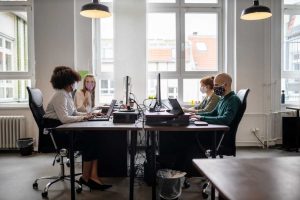Here’s where to sit in the office to make you more productive

With more workplaces re-opening as pandemic public health restrictions ease, experts are offering tips on choosing the right place to sit to help you be more productive on your return to the office.
The pandemic has completely transformed the workplace, with companies adopting hybrid working models and even choosing to downsize, due to the reduced number of people being allowed in the office at the same time.
Fewer people in the office might mean more choice for desk space, while an office downsize might result in more "hot desking," where people switch and share seating depending on when they come into work.
All of this could mean greater choice, something which workers might welcome if they're struggling to be productive and adjusting to working in an office environment again.
Here's what the experts say when it comes to choosing the perfect spot to work in the office.
'Engrained human behavior'
A recently published study by academics at the University College London found that sitting at a desk facing the room with a small number of people in sight "resulted in significantly higher odds for positive ratings of focused work and perceived productivity."
However, a seat facing too many people "made it less likely for the environment to be considered supportive of team identity, sharing information, meeting others in planned ways, concentrating on tasks and working productively."
The study polled 172 workers at the headquarters of a global technology company in London, and was conducted prior to the pandemic.
Kerstin Sailer, one of the authors of the study, told CNBC via video call that psychologically if a worker sees a lot of colleagues sat at desks in front of them they "don't want to disturb them, so there's that sense of solidarity in the workplace."
There's also greater visual and noise distractions the more people that a desk is facing.
Meanwhile, the study also suggested that facing away from the room was disconcerting for workers, as it hindered their ability to communicate with others.
Sailer said this was linked to "deeply engrained human behavior" of feeling the need to have a "protected back."
"Psychologically it links to the feeling of control, the feeling that I can control the room visually, rather than there's lots of surprises behind my back," she said.
The small study also indicated that window seats were preferable in terms of enabling workers to have greater focus, when compared to a seat by the wall.
Once again, Sailer said this was likely linked to an engrained human preference to have exposure to more daylight.
A study in the U.S. last year found that office workers with exposure to natural daylight slept 37 minutes more a night and were also better at making decisions.
'Power position'
Linda Chu, founder of professional organizing solutions consultancy Out of Chaos, told CNBC via video call that there are principles linked to Feng Shui about the benefits of being in a "power position."
"You feel much more in power when you have a strong backing, so with a wall behind you for example, which is a signal of strength, but what that really means intuitively is that nobody behind you can come and sneak up on you unaware," Chu explained.
Similarly, Lily Bernheimer, founding director at environment psychology consultancy Space Works Consulting, suggested that people sit in what she calls "ninja-proof seats" wherever possible.
She explained that a ninja-proof seat is one with its back to the wall, "providing a sense of refuge and security."
Bernheimer also said workers should aim to try to position themselves with a "good window view outdoors, as this can enhance mental function by up to 25%."
Check out:
- Fear of public speaking? The biggest mistake to avoid—and 5 things to focus on, according to a speech expert
- ‘Ghosted’ after a job interview? Here’s a sample follow-up email—and what to do if you still don’t hear back
Source: Read Full Article
